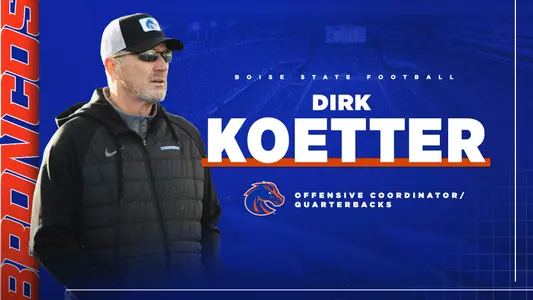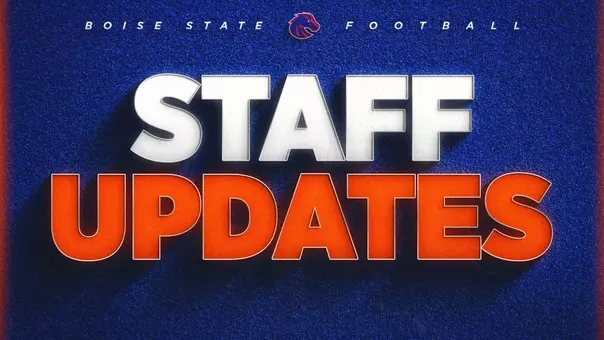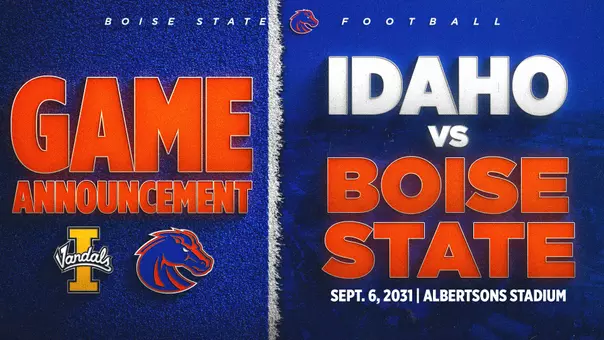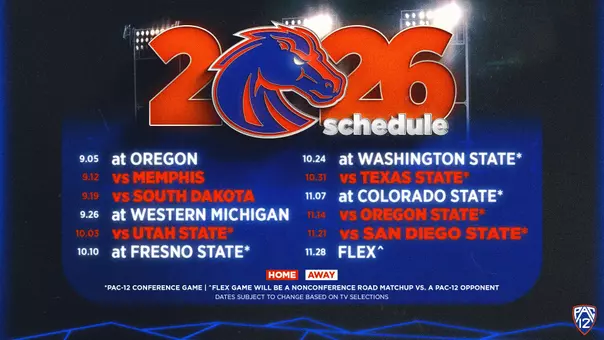Boise State Athletics

Dirk Koetter Returns to Boise State as Offensive Coordinator
2/28/2024 12:59:00 PM | Football
Bronco legend, long-time college and NFL head coach to guide Boise State offense in 2024
BOISE, Idaho – Coaching legend Dirk Koetter (pronounced 'Cutter'), no stranger to Bronco Nation, will be back on The Blue in 2024 as he was named Boise State's offensive coordinator and quarterbacks coach on Wednesday by head coach Spencer Danielson.
The former head coach in the collegiate ranks and NFL is back once again as the Broncos' offensive coordinator for the 2024 season. Koetter's new contract with Boise State is subject to approval by the Idaho State Board of Education.
"In adding Dirk Koetter for this season, we are able to get everything I was searching for in an offensive coordinator," Danielson said. "He is a proven play caller, a great developer of quarterbacks and someone that can not only lead a dynamic offense but also will invest in the lives of our student-athletes, both on and off the field. It will also allow our offense to hit the ground running with spring practice less than two weeks away."
Koetter returns to a familiar sideline that he patrolled as head coach from 1998 to 2000 and then again as interim offensive coordinator in 2022. Opposing defenses beware.
"I am happy to be back, even if I didn't see this coming. When Spencer Danielson offered me this opportunity, I said yes for four reasons with the first being my utmost belief in and respect for Coach D and what he is building here. It was also because of my respect for the tradition of Bronco Football and how highly I think of this coaching staff. Last, but not least, it was how impressed I was with what this team did in its run last year to a Mountain West championship. That attitude, determination and work ethic is the exact type of program Boise State is supposed to be and to which I want to contribute."
Every time the native Idahoan has donned the Blue and Orange, offensive fireworks have followed. He returned to Boise State has an offensive analyst in 2022 only to find himself thrust back on the sidelines as interim offensive coordinator a mere four weeks into the season. The result was an offense that began averaging 19.5 more yards per game than before Koetter's elevation and a team that was stuck in neutral at 2-2 following a loss at UTEP before Koetter's guidance ignited the Broncos to win seven of their next eight games, claiming a spot in the Mountain West Championship Game and concluding the season with a 35-32 win over North Texas in the Frisco Bowl.
"Coach Koetter runs an offense that I and our entire staff believes in," Danielson said further of Koetter returning to The Blue. "His addition is not just a one-year short term fix, he will be able to coach, teach and guide everyone in our facility in a way that will set our program up for future sustained success."
Koetter in the NFL
Before he came back to Boise and the collegiate game, Koetter spent 14 years in the NFL including three seasons as head coach of the Tampa Bay Buccaneers. He made his professional coaching debut in 2007 as the offensive coordinator of the Jacksonville Jaguars where he found immediate success, setting franchise records for total points scored and yards gained while helping the Jags to an 11-5 record. In his five seasons with the Jaguars, the team cumulatively ranked third in the NFL in rushing yards.
In 2012, Koetter became offensive coordinator of the Atlanta Falcons, beginning a three-year stint in Georgia's capital city. His guidance immediately had an impact as the Falcons finished the 2012 season with a league-best 13-3 record and the No. 1 seed in the NFC. They would advance to their first NFC Championship game appearance in eight years, and third overall appearance.
After spending one season as offensive coordinator with the Tampa Bay Buccaneers, he was elevated to head coach of the Bucs on Jan. 15, 2016 and navigated the team to a 9-7 record in his first of three seasons as head coach, barely missing the playoffs. He would return to the Falcons for two more seasons as offensive coordinator starting in 2019 before stepping away from the game for a year. That brought his coaching career full circle.
Koetter at Boise State
To properly recognize the magnificence of Boise State football at Koetter's (initial) departure, one must understand the state of the program upon his arrival. Two years removed from Boise State's induction into the Division I-A/FBS ranks, one year after a Bronco Stadium renovation produced 7,400 additional seats and earned the right to host the annual Humanitarian Bowl, the Broncos were coming off their fourth losing season in six years and their second in a row.
Enter Koetter as the seventh coach head coach in Boise State history. Welcome, winning season. Sure, it was only a 6-5 finish, but there was reason to be excited. In his first head coaching job at that level, Koetter had just guided the Broncos to their first winning season in D-I. You could see the improvement in the numbers. While the 2-10 team of 1996 averaged a mere 20 points per game, and the 5-6 team of 1997 improved to 25.9, Koetter's offensive wizardry made the Broncos a team that averaged nearly 30 points per game (settling for 29.9) and finished the season ranked 24th in the nation in total offense. One game over .500 or not, the Broncos were one play away from winning the Big West Championship in a season that had already extended past its scheduled hours. At home against Idaho in the final game of the '98 season, Koetter endured pain that cannot be matched outside a rivalry game as the Vandals faked an extra point try and came up with a two-point conversion to claim the conference crown in overtime, 36-35. As sour as that moment had been, as much as it may have defined that game or that season, it would serve as a point of motivation in the future. It was Koetter's Alamo, a tragic loss that ultimately led to wins in the future.
Over the next two seasons, few teams that played Boise STate would be able to say that the game came down to one play. The 1999 season that began at 1-2, including a loss at No. 17/13 UCLA, saw the Broncos rally to win nine of their final 10 games and finish at 10-3. Clearly getting stronger with the season, Boise State won its last six, not by one play, not by an extra point or a field goal, but by an average of 24.5 points per contest. Included in that span was a 63-10 trouncing of Arkansas State, a 45-14 slaying of Idaho and a 34-31 Humanitarian Bowl victory over Louisville in front of the Boise faithful. When Boise State transformed into a four-year school and athletic department, it took six years before the Broncos would win a conference championship. After moving up from Division I-AA/FCS to Division I-A/FBS, it took only four years to bring home a trophy thanks to Koetter's guidance.
And yet Koetter's third season was without question Boise's finest. After two winning seasons, including BSU's first Division I-A bowl appearance and victory, the Broncos' football program certainly bore the signature of their head coach, but for the first time in many years they were also shouldered with expectations. If that was supposed to be a burden, the Broncos didn't appear to notice. Instead, they took to the field in 2000 like a championship act, turning in a spectacular performance week after week. In the second week of the season, Boise State defeated its opponent by 25 points. In the fourth week it was 27. In the seventh week, 59. In the final two games of the regular season, the Broncos first sent Utah State home at 66-38 and then dismissed Idaho, 66-24. Once again Koetter was named Big West Coach of the Year. Once again, his Broncos were conference champions. Once again, they were all staying home to party in the Humanitarian Bowl.
Meanwhile, like never before, the Broncos were invading the national football scene at the sport's highest amateur level. At the end of the regular season, that was Boise State ranked No. 1 in scoring offense - not in the Big West, not on the West Coast, but in the nation. That was Boise State at No. 2 in total offense and No. 4 in passing offense. At the helm of Koetter's big-play attack, that was quarterback Bart Hendricks leading the nation in passing efficiency and touchdown passes. Producing 330.27 yards per game, that was Hendricks ranking fourth in total offense. That was Hendricks, too, leading the Broncos in Boise State's second straight Humanitarian Bowl win, toppling UTEP 38-23. As if demonstrating the versatility of Koetter's offense to fans eagerly watching on ESPN2, Hendricks threw two touchdown passes, ran for one and caught another. Koetter's career record at Boise State wrapped at 26-10, including wins in 20 of his last 25 games. To his incumbent staff, he left winning streaks of seven overall and 14 at home (including the two bowl wins) upon which to build. More importantly, he left proof that Boise State could not only compete at the Division I-A/FBS level, it could and would excel.
That transformational success caught the eye of other programs and as Boise State began a new era of Broncos football, Koetter left the reigns of the program in good hands. Koetter would accept the head coaching job at Arizona State as Boise State would move to the Western Athletic Conference and Broncos assistant coach Dan Hawkins would be promoted to attempt to fill Koetter's shoes.
Koetter at Arizona State
The transition from snow-capped Rocky Mountains to sun-kissed Sonoran Desert was hardly rocky for Koetter. He would guide the Sun Devils to four bowl appearances in his six seasons in Tempe, the most for Arizona State since the early 1990s. His leadership and offensive acumen returned the Sun Devils to the national spotlight and helped the program become a potential yearly Pac-10 championship contender that was frequently and consistently ranked within weekly polls.
Koetter compiled a 40-34 (.541) record in his six seasons at Arizona State, one of only three (out of nine) head coaches to reach 40 wins with the Sun Devils between 1980 to 2023. He posted a win percentage greater than .622 over his final three seasons while leading the program to three consecutive bowl games for the first time since 1985-87.
Throughout his tenure in Tempe, Koetter directed ASU's all-time leading passer in Andrew Walter, its top career receiver in Derek Hagan, as well as Arizona State's only second unanimous All-American honoree Terrell Suggs, who in 2002 established the NCAA single season record with 24 sacks before winning the Bronko Nagurski, Ted Hendricks and Rotary Lombardi Awards. Additionally, Suggs (2002) and Dale Robinson (2005) earned Pac-10 Conference Pat Tillman Defensive Player of the Year honors under Koetter's guidance. Also, each Sun Devil team during Koetter's Sun Devil career has showcased a 1,000-yard receiver. Prior to Koetter's arrival in Tempe in 2001, only four times in ASU history a receiver had surpassed the 1,000-yard mark in a single season.
The 2000 football season was hardly normal at Arizona State University. So, when Dirk Koetter was named the 21st head football coach in ASU history Dec. 2, some had to be shaking their heads. Or maybe they were nodding along, because in a season where abnormality was commonplace, Koetter seemed to fit the mold. Who was this guy? The day after athletic director Gene Smith announced the heir to the Sun Devil throne, the media couldn't even agree on the pronunciation of the coach's surname (for the record, it's `Cutter'). It was nice to learn that in just three seasons at Boise State University, Koetter was a two-time Big West Coach of the Year and two-time conference champion. It was great to find that before BSU, Koetter spent two years as the offensive coordinator at the University of Oregon, guiding the team to a school-record 32 touchdown passes in 1997.
Yet the more one learned about Koetter, the more the mystery surrounding the man grew. A native of Pocatello, Idaho, coming off that three-year stint in Boise, Koetter was traveling from a land where the winters were packed with cold and snow to a climate where f-words like frigid and freezing are absent from the lexicon. Months away from his first home game on the lush green grass of Sun Devil Stadium, at Koetter's previous arena his team played on turf that was not only artificial, but blue as an ocean. While the Sun Devils play to a major metropolitan area, Koetter was coming from a town with an environment more intimate than even the Boise population of 350,000 would suggest.
At ASU, Koetter was inheriting a program where Pasadena and the Rose Bowl are always the dream destination. At Boise State, Koetter thrilled legions of fans by earning back-to-back bowl bids to the Humanitarian Bowl, berths that meant staying home for another game on the blue turf of Bronco Stadium. Perhaps these were unimportant revelations regarding Koetter, but his identity seemed elusive and hard to grasp. Some tales suggested Koetter was extremely hands-on, a coach who operated as his own offensive coordinator and called every play from the sidelines. But then there was evidence that he preferred the shadows, entrusting his assistants handle the pre-game speeches in all but two occasions: the first game of a season and the last. While Koetter made it clear that his high-octane offense was reliant upon calculated vertical attacks, he was surprisingly flexible in formation, willing to try almost any scheme he felt put the 11 best athletes on the field.
Even off the field, it was hard to get a reading on ASU's new general. While at Boise State, some - including himself - had called him cocky and distant. Others - including himself - described him as confident and determined. To those involved with ASU, Koetter's character will be determined by his years in the Valley of the Sun. How his Sun Devils get into the end zone will be as important as how they get into the community. How they compete inside the classroom will be as crucial as how they succeed inside the margins of the field.
The Koetter File
Born Feb. 5, 1959, in Pocatello, Idaho, Koetter's collegiate coaching career saw five stops before Boise State. Koetter's first stop was at San Francisco State, where he spent 1985 as the offensive coordinator. At UTEP from 1986-88, Koetter served his first of four straight stints as offensive coordinator and quarterbacks coach, later moving on to Missouri (1989-93), Boston College (1994-95) and Oregon (1996-97). Boise State gave Koetter his first head coaching job (1998-2000), and he returned the favor with three winning seasons, two conference titles, two Humanitarian Bowl wins and two Big West Conference Coach of the Year honors.
A 1981 graduate of Idaho State University with a bachelor's degree in physical education, Koetter was a four-year letterwinner for the Bengals. During his playing career at ISU, Koetter achieved Big Sky Conference and NCAA Region 7 all-academic honors and led Idaho State in 1981 to a win over Boise State, the Bengals' first win over the Broncos in more than a decade. He earned a master's degree in athletic administration from Idaho State in 1982.
Dirk and his wife, Kim, are parents to an athletic family with two daughters, Kaylee and Kendra, and two sons, Derek and Davis. His youngest son, Davis, is currently an analyst at Texas and is a Boise State alumnus and former letterwinner. Derek, his oldest son, is a social media and marketing brand manager in Tampa, Florida after working in collegiate athletics as an athletic communications and creative services coordinator at the University of Tampa and the Big 12 Conference, while his oldest daughter, Kaylee Koetter Prigge, was a four-year volleyball letterwinner at Tampa and is now the head volleyball coach at Wyoming. Kendra, the youngest daughter, played two seasons of volleyball at North Carolina following two seasons at Georgia Southern.
For complete coverage of Boise State Football, download the Bronco Sports App or follow the team on social media on Instagram, Facebook and Twitter/X.
The former head coach in the collegiate ranks and NFL is back once again as the Broncos' offensive coordinator for the 2024 season. Koetter's new contract with Boise State is subject to approval by the Idaho State Board of Education.
"In adding Dirk Koetter for this season, we are able to get everything I was searching for in an offensive coordinator," Danielson said. "He is a proven play caller, a great developer of quarterbacks and someone that can not only lead a dynamic offense but also will invest in the lives of our student-athletes, both on and off the field. It will also allow our offense to hit the ground running with spring practice less than two weeks away."
Koetter returns to a familiar sideline that he patrolled as head coach from 1998 to 2000 and then again as interim offensive coordinator in 2022. Opposing defenses beware.
"I am happy to be back, even if I didn't see this coming. When Spencer Danielson offered me this opportunity, I said yes for four reasons with the first being my utmost belief in and respect for Coach D and what he is building here. It was also because of my respect for the tradition of Bronco Football and how highly I think of this coaching staff. Last, but not least, it was how impressed I was with what this team did in its run last year to a Mountain West championship. That attitude, determination and work ethic is the exact type of program Boise State is supposed to be and to which I want to contribute."
Every time the native Idahoan has donned the Blue and Orange, offensive fireworks have followed. He returned to Boise State has an offensive analyst in 2022 only to find himself thrust back on the sidelines as interim offensive coordinator a mere four weeks into the season. The result was an offense that began averaging 19.5 more yards per game than before Koetter's elevation and a team that was stuck in neutral at 2-2 following a loss at UTEP before Koetter's guidance ignited the Broncos to win seven of their next eight games, claiming a spot in the Mountain West Championship Game and concluding the season with a 35-32 win over North Texas in the Frisco Bowl.
"Coach Koetter runs an offense that I and our entire staff believes in," Danielson said further of Koetter returning to The Blue. "His addition is not just a one-year short term fix, he will be able to coach, teach and guide everyone in our facility in a way that will set our program up for future sustained success."
Koetter in the NFL
Before he came back to Boise and the collegiate game, Koetter spent 14 years in the NFL including three seasons as head coach of the Tampa Bay Buccaneers. He made his professional coaching debut in 2007 as the offensive coordinator of the Jacksonville Jaguars where he found immediate success, setting franchise records for total points scored and yards gained while helping the Jags to an 11-5 record. In his five seasons with the Jaguars, the team cumulatively ranked third in the NFL in rushing yards.
In 2012, Koetter became offensive coordinator of the Atlanta Falcons, beginning a three-year stint in Georgia's capital city. His guidance immediately had an impact as the Falcons finished the 2012 season with a league-best 13-3 record and the No. 1 seed in the NFC. They would advance to their first NFC Championship game appearance in eight years, and third overall appearance.
After spending one season as offensive coordinator with the Tampa Bay Buccaneers, he was elevated to head coach of the Bucs on Jan. 15, 2016 and navigated the team to a 9-7 record in his first of three seasons as head coach, barely missing the playoffs. He would return to the Falcons for two more seasons as offensive coordinator starting in 2019 before stepping away from the game for a year. That brought his coaching career full circle.
Koetter at Boise State
To properly recognize the magnificence of Boise State football at Koetter's (initial) departure, one must understand the state of the program upon his arrival. Two years removed from Boise State's induction into the Division I-A/FBS ranks, one year after a Bronco Stadium renovation produced 7,400 additional seats and earned the right to host the annual Humanitarian Bowl, the Broncos were coming off their fourth losing season in six years and their second in a row.
Enter Koetter as the seventh coach head coach in Boise State history. Welcome, winning season. Sure, it was only a 6-5 finish, but there was reason to be excited. In his first head coaching job at that level, Koetter had just guided the Broncos to their first winning season in D-I. You could see the improvement in the numbers. While the 2-10 team of 1996 averaged a mere 20 points per game, and the 5-6 team of 1997 improved to 25.9, Koetter's offensive wizardry made the Broncos a team that averaged nearly 30 points per game (settling for 29.9) and finished the season ranked 24th in the nation in total offense. One game over .500 or not, the Broncos were one play away from winning the Big West Championship in a season that had already extended past its scheduled hours. At home against Idaho in the final game of the '98 season, Koetter endured pain that cannot be matched outside a rivalry game as the Vandals faked an extra point try and came up with a two-point conversion to claim the conference crown in overtime, 36-35. As sour as that moment had been, as much as it may have defined that game or that season, it would serve as a point of motivation in the future. It was Koetter's Alamo, a tragic loss that ultimately led to wins in the future.
Over the next two seasons, few teams that played Boise STate would be able to say that the game came down to one play. The 1999 season that began at 1-2, including a loss at No. 17/13 UCLA, saw the Broncos rally to win nine of their final 10 games and finish at 10-3. Clearly getting stronger with the season, Boise State won its last six, not by one play, not by an extra point or a field goal, but by an average of 24.5 points per contest. Included in that span was a 63-10 trouncing of Arkansas State, a 45-14 slaying of Idaho and a 34-31 Humanitarian Bowl victory over Louisville in front of the Boise faithful. When Boise State transformed into a four-year school and athletic department, it took six years before the Broncos would win a conference championship. After moving up from Division I-AA/FCS to Division I-A/FBS, it took only four years to bring home a trophy thanks to Koetter's guidance.
And yet Koetter's third season was without question Boise's finest. After two winning seasons, including BSU's first Division I-A bowl appearance and victory, the Broncos' football program certainly bore the signature of their head coach, but for the first time in many years they were also shouldered with expectations. If that was supposed to be a burden, the Broncos didn't appear to notice. Instead, they took to the field in 2000 like a championship act, turning in a spectacular performance week after week. In the second week of the season, Boise State defeated its opponent by 25 points. In the fourth week it was 27. In the seventh week, 59. In the final two games of the regular season, the Broncos first sent Utah State home at 66-38 and then dismissed Idaho, 66-24. Once again Koetter was named Big West Coach of the Year. Once again, his Broncos were conference champions. Once again, they were all staying home to party in the Humanitarian Bowl.
Meanwhile, like never before, the Broncos were invading the national football scene at the sport's highest amateur level. At the end of the regular season, that was Boise State ranked No. 1 in scoring offense - not in the Big West, not on the West Coast, but in the nation. That was Boise State at No. 2 in total offense and No. 4 in passing offense. At the helm of Koetter's big-play attack, that was quarterback Bart Hendricks leading the nation in passing efficiency and touchdown passes. Producing 330.27 yards per game, that was Hendricks ranking fourth in total offense. That was Hendricks, too, leading the Broncos in Boise State's second straight Humanitarian Bowl win, toppling UTEP 38-23. As if demonstrating the versatility of Koetter's offense to fans eagerly watching on ESPN2, Hendricks threw two touchdown passes, ran for one and caught another. Koetter's career record at Boise State wrapped at 26-10, including wins in 20 of his last 25 games. To his incumbent staff, he left winning streaks of seven overall and 14 at home (including the two bowl wins) upon which to build. More importantly, he left proof that Boise State could not only compete at the Division I-A/FBS level, it could and would excel.
That transformational success caught the eye of other programs and as Boise State began a new era of Broncos football, Koetter left the reigns of the program in good hands. Koetter would accept the head coaching job at Arizona State as Boise State would move to the Western Athletic Conference and Broncos assistant coach Dan Hawkins would be promoted to attempt to fill Koetter's shoes.
Koetter at Arizona State
The transition from snow-capped Rocky Mountains to sun-kissed Sonoran Desert was hardly rocky for Koetter. He would guide the Sun Devils to four bowl appearances in his six seasons in Tempe, the most for Arizona State since the early 1990s. His leadership and offensive acumen returned the Sun Devils to the national spotlight and helped the program become a potential yearly Pac-10 championship contender that was frequently and consistently ranked within weekly polls.
Koetter compiled a 40-34 (.541) record in his six seasons at Arizona State, one of only three (out of nine) head coaches to reach 40 wins with the Sun Devils between 1980 to 2023. He posted a win percentage greater than .622 over his final three seasons while leading the program to three consecutive bowl games for the first time since 1985-87.
Throughout his tenure in Tempe, Koetter directed ASU's all-time leading passer in Andrew Walter, its top career receiver in Derek Hagan, as well as Arizona State's only second unanimous All-American honoree Terrell Suggs, who in 2002 established the NCAA single season record with 24 sacks before winning the Bronko Nagurski, Ted Hendricks and Rotary Lombardi Awards. Additionally, Suggs (2002) and Dale Robinson (2005) earned Pac-10 Conference Pat Tillman Defensive Player of the Year honors under Koetter's guidance. Also, each Sun Devil team during Koetter's Sun Devil career has showcased a 1,000-yard receiver. Prior to Koetter's arrival in Tempe in 2001, only four times in ASU history a receiver had surpassed the 1,000-yard mark in a single season.
The 2000 football season was hardly normal at Arizona State University. So, when Dirk Koetter was named the 21st head football coach in ASU history Dec. 2, some had to be shaking their heads. Or maybe they were nodding along, because in a season where abnormality was commonplace, Koetter seemed to fit the mold. Who was this guy? The day after athletic director Gene Smith announced the heir to the Sun Devil throne, the media couldn't even agree on the pronunciation of the coach's surname (for the record, it's `Cutter'). It was nice to learn that in just three seasons at Boise State University, Koetter was a two-time Big West Coach of the Year and two-time conference champion. It was great to find that before BSU, Koetter spent two years as the offensive coordinator at the University of Oregon, guiding the team to a school-record 32 touchdown passes in 1997.
Yet the more one learned about Koetter, the more the mystery surrounding the man grew. A native of Pocatello, Idaho, coming off that three-year stint in Boise, Koetter was traveling from a land where the winters were packed with cold and snow to a climate where f-words like frigid and freezing are absent from the lexicon. Months away from his first home game on the lush green grass of Sun Devil Stadium, at Koetter's previous arena his team played on turf that was not only artificial, but blue as an ocean. While the Sun Devils play to a major metropolitan area, Koetter was coming from a town with an environment more intimate than even the Boise population of 350,000 would suggest.
At ASU, Koetter was inheriting a program where Pasadena and the Rose Bowl are always the dream destination. At Boise State, Koetter thrilled legions of fans by earning back-to-back bowl bids to the Humanitarian Bowl, berths that meant staying home for another game on the blue turf of Bronco Stadium. Perhaps these were unimportant revelations regarding Koetter, but his identity seemed elusive and hard to grasp. Some tales suggested Koetter was extremely hands-on, a coach who operated as his own offensive coordinator and called every play from the sidelines. But then there was evidence that he preferred the shadows, entrusting his assistants handle the pre-game speeches in all but two occasions: the first game of a season and the last. While Koetter made it clear that his high-octane offense was reliant upon calculated vertical attacks, he was surprisingly flexible in formation, willing to try almost any scheme he felt put the 11 best athletes on the field.
Even off the field, it was hard to get a reading on ASU's new general. While at Boise State, some - including himself - had called him cocky and distant. Others - including himself - described him as confident and determined. To those involved with ASU, Koetter's character will be determined by his years in the Valley of the Sun. How his Sun Devils get into the end zone will be as important as how they get into the community. How they compete inside the classroom will be as crucial as how they succeed inside the margins of the field.
The Koetter File
Born Feb. 5, 1959, in Pocatello, Idaho, Koetter's collegiate coaching career saw five stops before Boise State. Koetter's first stop was at San Francisco State, where he spent 1985 as the offensive coordinator. At UTEP from 1986-88, Koetter served his first of four straight stints as offensive coordinator and quarterbacks coach, later moving on to Missouri (1989-93), Boston College (1994-95) and Oregon (1996-97). Boise State gave Koetter his first head coaching job (1998-2000), and he returned the favor with three winning seasons, two conference titles, two Humanitarian Bowl wins and two Big West Conference Coach of the Year honors.
A 1981 graduate of Idaho State University with a bachelor's degree in physical education, Koetter was a four-year letterwinner for the Bengals. During his playing career at ISU, Koetter achieved Big Sky Conference and NCAA Region 7 all-academic honors and led Idaho State in 1981 to a win over Boise State, the Bengals' first win over the Broncos in more than a decade. He earned a master's degree in athletic administration from Idaho State in 1982.
Dirk and his wife, Kim, are parents to an athletic family with two daughters, Kaylee and Kendra, and two sons, Derek and Davis. His youngest son, Davis, is currently an analyst at Texas and is a Boise State alumnus and former letterwinner. Derek, his oldest son, is a social media and marketing brand manager in Tampa, Florida after working in collegiate athletics as an athletic communications and creative services coordinator at the University of Tampa and the Big 12 Conference, while his oldest daughter, Kaylee Koetter Prigge, was a four-year volleyball letterwinner at Tampa and is now the head volleyball coach at Wyoming. Kendra, the youngest daughter, played two seasons of volleyball at North Carolina following two seasons at Georgia Southern.
For complete coverage of Boise State Football, download the Bronco Sports App or follow the team on social media on Instagram, Facebook and Twitter/X.
--BroncoSports.com--
Boise State vs. Idaho in football is BACK
Thursday, February 12
Coach Pete Going into the College Football Hall of Fame
Wednesday, January 14
Bronco Studios: Jeramiah Dickey, Evolving College Football
Monday, December 29
Boise State Football: Built Different (2026)
Friday, December 19




.png&width=60&height=60&type=webp)














